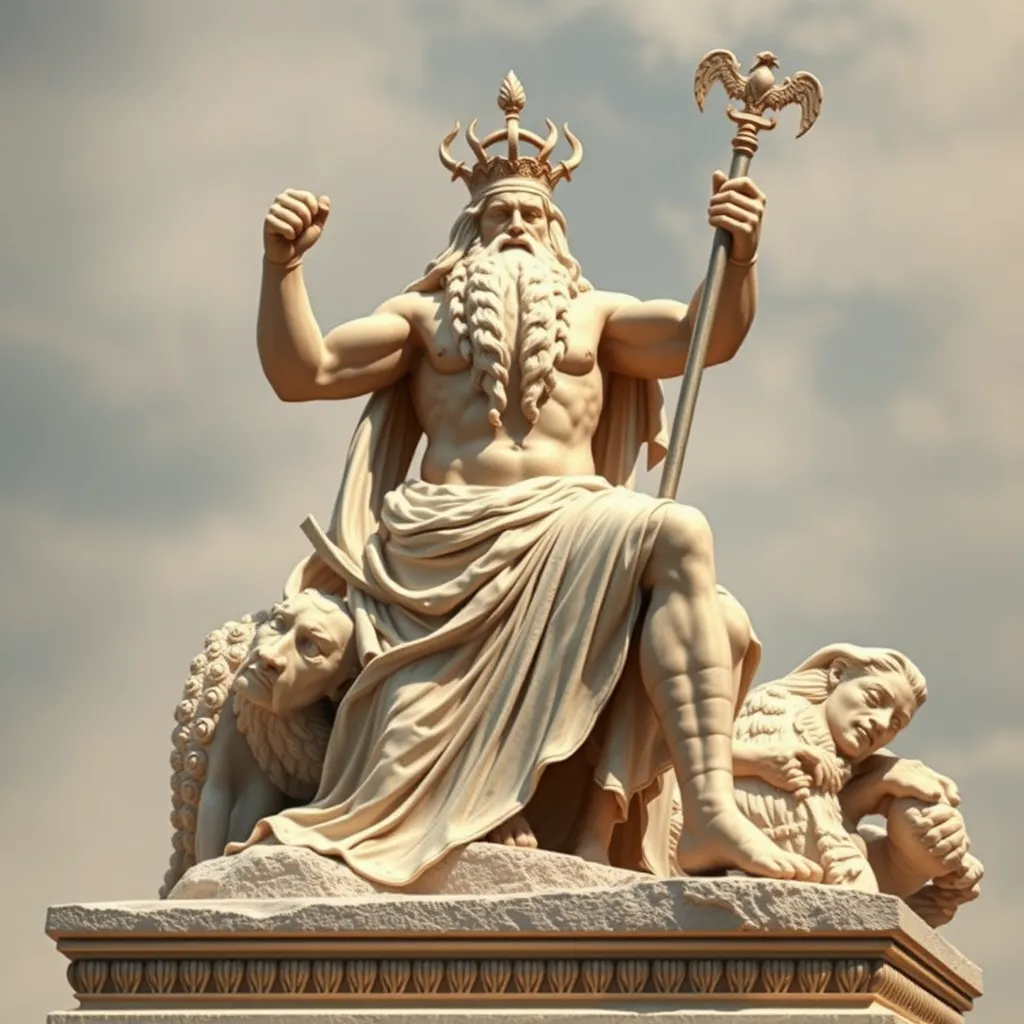Zeus’s Role in the Homeric Epics: A Literary Analysis
I. Introduction
The Homeric Epics, comprising The Iliad and The Odyssey, are foundational texts of Ancient Greek literature. They not only tell the stories of Trojan War heroes and their journeys but also explore profound themes of human existence, morality, and divine influence. Central to these narratives is Zeus, the king of the gods, whose presence and decisions significantly shape the events that unfold.
This analysis aims to delve into the multifaceted role of Zeus within these epic poems, examining his characteristics, influence on mortals, relationships with other deities, and his symbolic representations. By exploring these dimensions, we can better understand the complex interplay between divine authority and human agency depicted in Homer’s works.
II. The Nature of Zeus: King of the Gods
Zeus is portrayed as the supreme deity of the Greek pantheon, embodying both power and responsibility. His characteristics include:
- Authority and leadership over the other gods
- Control over the sky and weather
- Symbolism associated with thunderbolts and oaths
As the king of the gods, Zeus occupies a unique position in Greek mythology. He is often seen as the ultimate arbiter of justice and order, reflecting the values of ancient Greek society. His role as a figure of authority symbolizes the need for balance and governance, both in the divine realm and among mortals.
III. Zeus’s Influence on Human Affairs
One of the most significant aspects of Zeus’s character is his direct involvement in mortal affairs. His interventions often highlight the tension between fate and free will:
- He grants favor to certain heroes, influencing their destinies.
- He punishes mortals for transgressions against the divine order.
Key characters such as Achilles and Odysseus exemplify the impact of Zeus’s decisions:
- Achilles is driven by his anger towards Agamemnon, which is influenced by Zeus’s initial decision to tip the scales of war.
- Odysseus’s journey home is fraught with challenges, many of which are orchestrated by Zeus’s will, either to test him or to teach him lessons of humility and respect.
IV. Zeus and the Themes of Justice and Order
Zeus is often associated with the concept of justice, known in Greek as Dike. His role in maintaining cosmic order (Kosmos) is paramount:
- He punishes hubris and rewards piety.
- His decisions often reflect the moral order of the universe, emphasizing the consequences of human actions.
Contrasting with other gods who may act out of personal vendettas or desires, Zeus often embodies a more impartial and overarching sense of justice, which serves to underscore the moral weight of his character in the epics.
V. Zeus’s Relationships with Other Gods and Mortals
Zeus’s interactions with other Olympian gods are complex and multifaceted. He often:
- Collaborates with Athena, showcasing shared values of wisdom and strategy.
- Engages in conflict with Hera, reflecting personal and political dynamics among the gods.
His relationships with heroes also play a crucial role in the narratives:
- Zeus’s favoritism can alter the course of events, as seen in his support for heroes like Perseus and Heracles.
- The divine council, where Zeus presides, illustrates the collaborative yet competitive nature of divine relationships.
VI. Zeus’s Role in the Narrative Structure
In both The Iliad and The Odyssey, Zeus functions as a critical narrative device. His presence often serves to:
- Introduce conflict or tension within the story.
- Facilitate resolutions, guiding characters towards their respective fates.
Key passages featuring Zeus include:
- His decree at the beginning of The Iliad sets the stage for the conflict between Achilles and Agamemnon.
- In The Odyssey, his decision to allow Odysseus to return home reflects the overarching themes of yearning and redemption.
VII. Symbolic Representations of Zeus in the Epics
The imagery and language associated with Zeus are rich and varied. He is often depicted as:
- A figure of immense power, wielding thunderbolts as symbols of authority.
- A divine overseer, watching over the actions of both gods and mortals.
From his actions, several symbolic meanings can be derived, particularly regarding:
- The balance of power and responsibility.
- The interplay between fate and divine intervention.
Zeus’s character influences the themes of power, fate, and morality throughout the epics, reflecting the complexities of human existence.
VIII. Conclusion
In summary, Zeus’s role in the Homeric Epics is multifaceted and deeply intertwined with the narratives of human experience. His characteristics as the king of the gods, his influence on mortal affairs, and his symbolic representations of justice and order underscore the enduring legacy of his character in literature and mythology.
As a figure that embodies the complexities of power, morality, and fate, Zeus remains relevant in contemporary interpretations of the Homeric Epics. His legacy invites readers to reflect on the dynamics of authority and agency in their own lives, making the exploration of his character a timeless endeavor.




